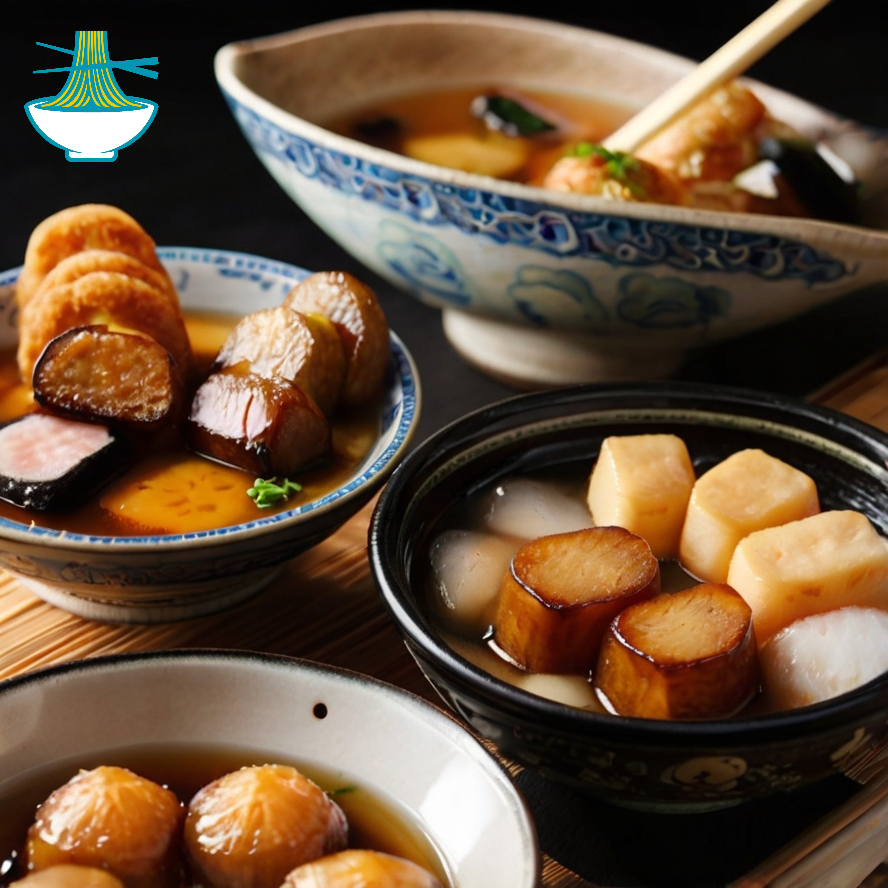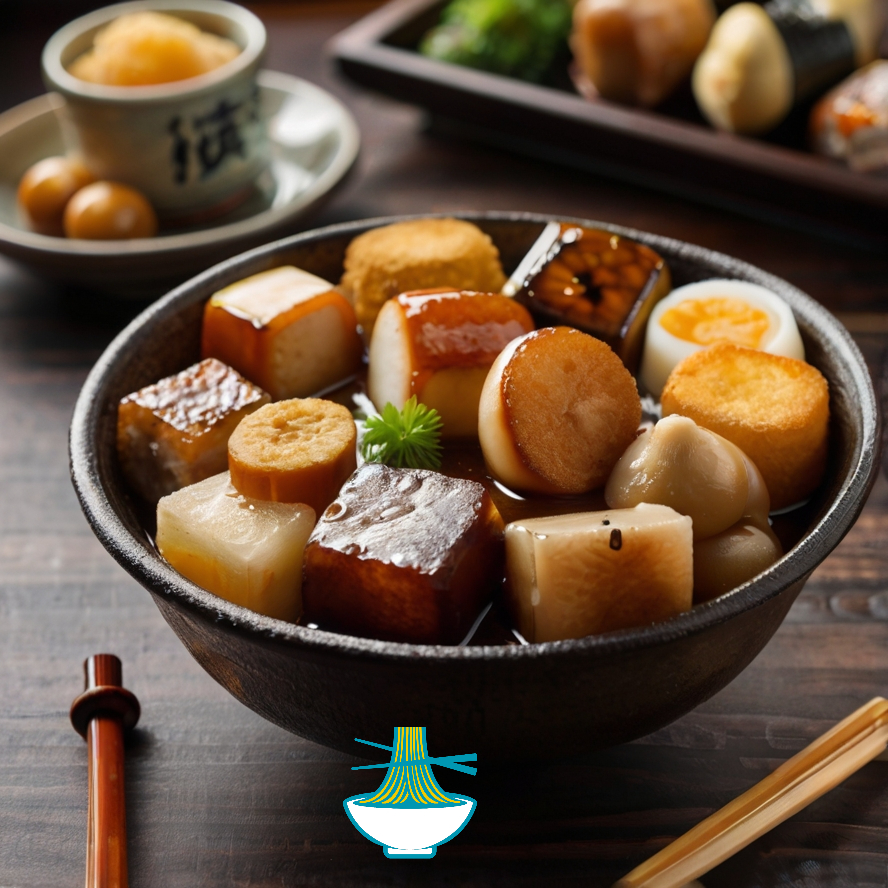Embark on a culinary journey through the heartwarming flavors of Japan with Oden, a beloved comfort food deeply rooted in Japanese culture. Our documentary delves into the rich history and cultural significance of Oden, showcasing its evolution from humble beginnings to becoming a cherished dish enjoyed by people of all ages.
Join us as we unravel the secrets behind the simmering broth infused with dashi, soy sauce, and mirin, which forms the soul of Oden. Discover the diverse array of ingredients, including fish cakes, tofu, daikon radish, and boiled eggs, each contributing its own unique texture and taste to this hearty stew.
Meet the artisans and chefs dedicated to preserving the authenticity of Oden while experimenting with innovative variations to tantalize modern palates. From traditional street vendors to upscale restaurants, witness how Oden continues to captivate taste buds across Japan and beyond.
Through interviews with locals and culinary experts, gain insights into the cultural significance of Oden, as it brings people together during chilly evenings and festive gatherings. Experience the warmth and comfort of Oden as it transcends mere sustenance to become a cherished symbol of community and tradition in Japanese cuisine.
Prepare to be immersed in the aromatic delights and heartwarming tales surrounding Japan's beloved Oden, a culinary experience that celebrates the essence of Japanese culinary heritage.
Ingredients:
- 6 cups dashi (Japanese soup stock)
- 1/2 cup soy sauce
- 1/4 cup mirin (Japanese sweet rice wine)
- 1 tablespoon sugar
- 1 tablespoon sake (Japanese rice wine)
- Assorted Oden ingredients (such as daikon radish, konnyaku, fish cakes, boiled eggs, tofu, mushrooms, and cabbage)
- Mustard, for serving
- Shichimi togarashi (Japanese seven spice blend), for serving (optional)
Instructions:
1- In a large pot, combine the dashi, soy sauce, mirin, sugar, and sake. Bring the mixture to a simmer over medium heat, stirring to dissolve the sugar.
2- Prepare the Oden ingredients by peeling and cutting the daikon radish into thick rounds, slicing the konnyaku into bite-sized pieces, cutting the fish cakes into slices, halving the boiled eggs, cutting the tofu into cubes, and slicing any other vegetables or ingredients you're using.
3- Add the daikon radish and konnyaku to the pot of simmering broth. Cook for about 15 minutes, or until they start to soften.
4- Add the fish cakes, boiled eggs, tofu, mushrooms, cabbage, and any other ingredients you're using to the pot. Allow everything to simmer together for another 15-20 minutes, or until all the ingredients are tender and infused with the flavors of the broth.
5- Once the Oden is cooked through and the flavors have melded together, it's ready to serve. Ladle the Oden into bowls and serve with mustard and shichimi togarashi on the side for dipping and seasoning.
6- Enjoy your homemade Japan Oden as a comforting and satisfying meal, perfect for warming up on chilly days or enjoying with friends and family.
Nutritional Values :
Here’s a breakdown of the Nutritional Values and Benefits for the ingredients used in making Oden, a Japanese hot pot dish:
Dashi (6 cups, ~1.4 liters):
- Calories: 60 kcal (approx. 10 kcal per cup)
- Fat: 0g
- Carbohydrates: 2g
- Protein: 2g
Benefits: Provides a rich umami flavor from the sea, low in calories and fat.
Soy Sauce (1/2 cup, ~120ml):
- Calories: 80 kcal
- Fat: 0g
- Carbohydrates: 8g
- Protein: 8g
Benefits: Adds saltiness and umami flavor; provides some protein.
Mirin (1/4 cup, ~60ml):
- Calories: 100 kcal
- Fat: 0g
- Carbohydrates: 23g
- Protein: 0g
Benefits: Adds sweetness and depth of flavor.
Sugar (1 tablespoon, ~12g):
- Calories: 45 kcal
- Fat: 0g
- Carbohydrates: 12g
- Protein: 0g
Benefits: Enhances sweetness in the broth.
Sake (1 tablespoon, ~15ml):
- Calories: 20 kcal
- Fat: 0g
- Carbohydrates: 0g
- Protein: 0g
Benefits: Adds a depth of flavor and slight sweetness.
Assorted Oden Ingredients:
Daikon Radish (1 cup, ~130g):
- Calories: 20 kcal
- Fat: 0g
- Carbohydrates: 5g
- Protein: 1g
Benefits: Adds crunch and freshness, low in calories and high in vitamin C.
Konnyaku (1 cup, ~150g):
- Calories: 10 kcal
- Fat: 0g
- Carbohydrates: 2g
- Protein: 0g
Benefits: Very low in calories and provides a unique texture.
Fish Cakes (1 cup, ~100g):
- Calories: 100 kcal
- Fat: 3g
- Carbohydrates: 12g
- Protein: 8g
Benefits: Adds protein and flavor to the dish.
Boiled Eggs (1 large egg, ~50g):
- Calories: 70 kcal
- Fat: 5g
- Carbohydrates: 1g
- Protein: 6g
Benefits: Provides protein and essential nutrients.
Tofu (1 cup, ~150g):
- Calories: 80 kcal
- Fat: 4g
- Carbohydrates: 2g
- Protein: 8g
Benefits: Adds protein and is a good source of iron.
Mushrooms (1 cup, ~70g):
- Calories:15 kcal
- Fat: 0g
- Carbohydrates: 3g
- Protein: 2g
Benefits: Provides umami flavor and some nutrients.
Cabbage (1 cup, ~70g):
- Calories: 20 kcal
- Fat: 0g
- Carbohydrates: 5g
- Protein: 1g
Benefits: Adds crunch and fiber; low in calories.
Condiments:
Mustard (1 teaspoon, ~5g):
- Calories:10 kcal
- Fat: 0g
- Carbohydrates: 1g
- Protein: 0g
Benefits: Adds a spicy kick with minimal calories.
Shichimi Togarashi (1 teaspoon, ~1g):
- Calories: 5 kcal
- Fat: 0g
- Carbohydrates: 1g
- Protein: 0g
Benefits: Adds a spicy, flavorful kick and some additional nutrients.
These values are approximate and can vary based on factors such as cooking methods and specific varieties of ingredients used. Always check the nutritional information on packaging or use a nutrition calculator for precise values.


Comments